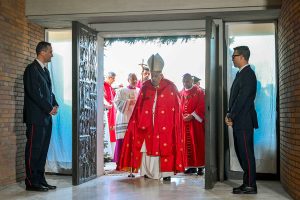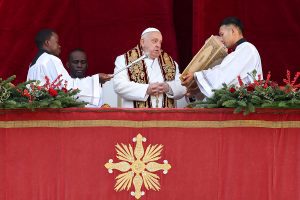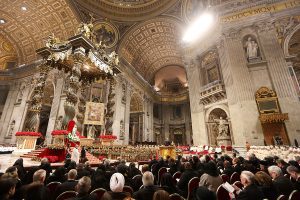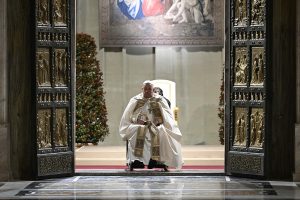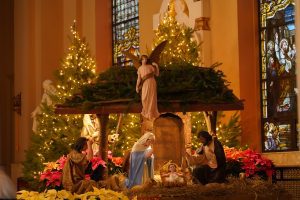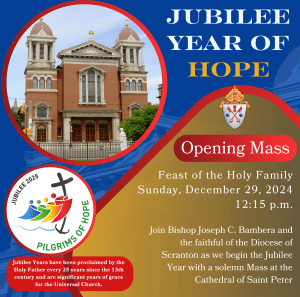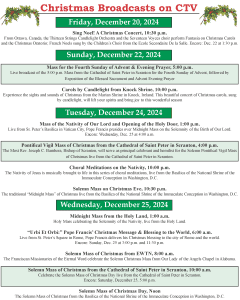VATICAN CITY (CNS) – In late November, during a brief audience with people involved in the sport of motorcycle racing, Pope Francis asked for prayers, joking that “my work is very accelerated, and my bike has aged and doesn’t work properly!”
Pope Francis, who celebrated his 88th birthday Dec. 17, mostly uses a wheelchair instead of walking and presides over rather than concelebrates most public liturgies. Still, he had a 2024 full of important engagements, the longest trip of his papacy and major preparations for the Holy Year 2025, which he opened Dec. 24.
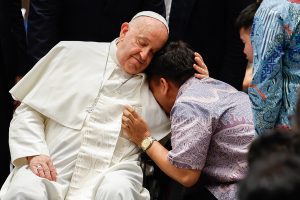
Health-wise, 2024 was a better year for the pope than 2023, when he ended up in the hospital twice: once for hernia surgery and once for a respiratory infection.
He did have a bout of bronchitis in February, canceled some meetings in September because of the flu and fell in December, hitting his chin on his bedside table and sporting a significant bruise on the right side of his face when he created 21 new cardinals Dec. 7.
For 12 days in early September, Pope Francis visited Indonesia, Papua New Guinea, Timor-Leste and Singapore – the longest trip of his papacy in terms of distance and time away from Rome. At his first general audience after his return, he publicly thanked God for allowing him “to do as an old pope what I would have liked to do as a young Jesuit,” which was to travel to Asia to preach the Gospel.
And two weeks later, he was boarding a plane again, flying to Luxembourg and then on to Belgium. He closed out his 2024 travels with a one-day visit to the French island of Corsica Dec. 15.
Excluding the opening of the Jubilee, his most anticipated event of 2024 was the final, four-weeklong assembly of the Synod of Bishops on synodality, the culmination of a process of listening and prayer that he launched in the fall of 2021.
In his homily at the synod’s opening Mass, Pope Francis said it was not a “parliamentary assembly,” but an effort to understand the history, dreams and hopes of “our brothers and sisters scattered around the world inspired by our same faith, moved by the same desire for holiness.”
He opened the assembly’s first working session responding to criticism that it was no longer a synod “of bishops,” since he had made dozens of lay women and men, priests and women religious voting members of the body.
“It is certainly not a matter of replacing one with the other, rallying to the cry: ‘Now it is our turn!'” the pope said.
Instead, the composition of the assembly “expresses a way of exercising the episcopal ministry consistent with the living tradition of the church and with the teaching of the Second Vatican Council,” which emphasized the responsibility of all the baptized for the mission of the church.
The assembly ended with the members approving a final document, and the pope ordering its publication as his own.
A month later, Pope Francis published a note telling bishops the final document “participates in the ordinary magisterium of the successor of Peter, and as such, I ask that it be accepted” and implemented.
The final document outlined key priorities for the church, including increased participation of the laity through new ministries and adjusted governing structures like pastoral councils, greater transparency and accountability among church leadership and creating space for previously marginalized groups.
But Pope Francis had taken off the table, at least temporarily, some of the more complex, sensitive issues raised in the listening sessions and at the first synod assembly in 2023.
In March he set up 10 study groups to look at issues such as ministry by women, seminary education, relations between bishops and religious communities and the role of nuncios; the groups were asked to work on proposals to give the pope by June 2025.
He told synod members those questions required more time, but he promised that “this is not the classical way of postponing decisions indefinitely.”
The year also saw the publication of Pope Francis’ fourth encyclical, “Dilexit nos” (“He loved us”), subtitled, “On the Human and Divine Love of the Heart of Jesus Christ.”
Prompted in part by the 350th-anniversary celebrations of the apparitions of the Heart of Jesus to St. Margaret Mary Alacoque at Paray-le-Monial, France, Pope Francis looked at how the traditional devotion to the Sacred Heart should help people recognize they are loved by God and called to love others.
Pope Francis said the document should be read with his previous encyclicals, “Laudato Si’, on Care for Our Common Home” and “Fratelli Tutti, on Fraternity and Social Friendship” because church teaching on social issues flows from “our encounter with the love of Jesus Christ.”
The horrors of the ongoing wars, particularly the fighting in Ukraine and the Middle East, were a daily concern of Pope Francis, but some of his comments led to controversy during the year.
In a televised interview in March, Pope Francis called for Russia and Ukraine to have the “courage of the white flag,” a term usually associated with surrender, and which therefore caused consternation among people who believe Ukraine has a right and duty to defend itself from Russian aggression.
Matteo Bruni, director of the Vatican press office, told reporters that the image of the white flag — a term used by the interviewer in posing the question — was picked up by the pope “to indicate the cessation of hostilities, a truce reached with the courage of negotiation,” not a call to surrender.
In November, the pope joined many Western leaders in sadly marking the 1,000th day since Russia launched its large-scale attack on Ukraine.
“I know well that no human word can protect their lives from the daily shelling, nor console those who mourn the dead, nor heal the wounded, nor repatriate the children, nor free the prisoners, nor mitigate the harsh effects of winter, nor bring back justice and peace,” he wrote in a letter to his nuncio in Kyiv.
He promised Ukrainians that he would continue his prayers to God, “the only source of life, hope and wisdom, that he would convert hearts and enable them to start paths of dialogue, reconciliation and concord.”
Pope Francis also called constantly for peace in the Middle East, the release of the hostages kidnapped by Hamas in October 2023 and for humanitarian aid to the people of Gaza.
But the pope drew criticism from Israeli officials in mid-November after Vatican News published an excerpt from a new book in which Pope Francis said, “According to some experts, what is happening in Gaza has the characteristics of genocide. It should be investigated carefully to determine whether it fits into the technical definition formulated by jurists and international bodies.”
Yaron Sideman, the Israeli ambassador to the Holy See, posted on X a few hours later: “There was a genocidal massacre on 7 October 2023 of Israeli citizens, and since then, Israel has exercised its right of self-defense against attempts from seven different fronts to kill its citizens.”
As the year drew to a close, Pope Francis called for “a ceasefire on all war fronts” in time for Christmas and the start of the Holy Year.

